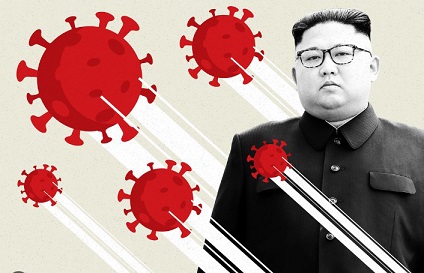Nikhil Prasad Fact checked by:Thailand Medical News Team Apr 03, 2024 1 year, 8 months, 1 week, 2 days, 12 hours, 33 minutes ago
COVID-19 News: In recent news reports, concerns are mounting over a significant resurgence of COVID-19-like infections in North Korea, particularly in the northern province of Ryanggang. This resurgence has forced authorities to keep elementary schools and childcare facilities closed beyond the anticipated reopening date of April 1, delaying the start of the new school year. The situation has sparked worries among residents and shed light on the challenges faced by the healthcare system in addressing these infections effectively.
 COVID-19 Infections Are Rising In Parts Of North Korea
COVID-19 Infections Are Rising In Parts Of North Korea
With genomic surveillance and even basic COVID-19 testing literally non-existent in the country, scientist and researchers from the country and also from countries elsewhere are clueless about what is really brewing and as to what SARS-CoV-2 sub-lineages could be behind the surge. However, with ATK test kits donated from China, state-run facilities and clinics have confirmed that COVID-19 infections are rising in the country.
Closure of Schools and Daycares in Ryanggang Province
Residents in North Korea revealed to Radio Free Asia that a respiratory illness resembling COVID-19 has led to the closure of schools and daycares in Ryanggang province. This decision was made following the deaths of at least five children in early March due to the respiratory disease. The symptoms observed were similar to those associated with COVID-19, prompting authorities to reimpose emergency quarantine measures reminiscent of the pandemic's worst phases.
https://www.rfa.org/english/news/korea/illness-04022024183042.html
While middle and high schools are set to commence classes as scheduled, elementary schools and daycares continue to face extended closures. The initial 10-day lockdown, which was expected to conclude in early April, has been extended due to ongoing concerns about the spread of the respiratory illness.
Identifying the Cause of Infections
Residents have cited mycoplasma as the primary cause of the recent infections. Mycoplasma is a type of bacteria known to cause mild pneumonia with symptoms such as sore throat, cough, and fever. Unlike COVID-19, which is caused by a virus, mycoplasma infections can be treated with antibiotics. However, access to effective medication remains a significant challenge for North Korean residents.
COVID-19 News reports in neighboring South Korea have also indicated that there is an acute shortage of many drugs for respiratory infections and lung infections in North Korea and first-hand encounters with North Koreans indicate the situation is dire at the moment with many getting sick but unable to access proper healthcare services.
Challenges in Accessing Treatment
North Korean medicine has been deemed ineffective in treating the current wave of infections. As a result, residents must rely on medicines supplied by the United Nations, which are of
ten prohibitively expensive. The high cost of these medications, including antipyretic injections to reduce fever, places a heavy financial burden on ordinary North Koreans, making treatment unaffordable for many.
The reliance on expensive UN-provided medicines highlights the broader healthcare challenges faced by North Korea's population. Limited access to essential medications raises concerns about the government's ability to effectively manage public health crises and provide adequate healthcare services to its citizens.
Calls for Government Action
Amid growing frustration, residents have called on authorities to take more proactive measures in treating infected individuals and reopening educational institutions. Many argue that the government's focus on selling UN-provided medicines for profit rather than prioritizing public health is exacerbating the situation.
The recent postponement of the school year has left many parents and students disappointed and concerned about the prolonged closure of educational facilities. Parents worry about the impact on their children's education and well-being, while the continued absence of effective medical interventions raises broader questions about the government's response to healthcare crises.
Historical Precedents and Future Uncertainties
This is not the first time North Korea has faced disruptions in its education system due to public health concerns. In 2020, the country delayed the start of the school year until June 1 due to the COVID-19 pandemic and subsequently declared an early vacation in July as conditions worsened. The current situation underscores the ongoing challenges posed by infectious diseases and highlights the need for robust healthcare infrastructure and preparedness.
As the situation continues to evolve, there is uncertainty about when daycare centers and elementary schools in Ryanggang province will reopen. The prolonged closures and ongoing healthcare challenges serve as a stark reminder of the complex issues facing North Korea's healthcare system and the resilience required to address them effectively.
Conclusion
The resurgence of COVID-19-like infections in North Korea's Ryanggang province has raised significant concerns about public health preparedness and access to essential medical treatments. The closure of schools and daycares, coupled with challenges in accessing effective medications, highlights the broader healthcare challenges faced by the country's residents. As efforts continue to contain the spread of infections and provide adequate healthcare services, there is a pressing need for proactive government action and international support to address these complex issues and safeguard public health in North Korea.
For the latest
COVID-19 News, keep on logging to Thailand Medical News.
